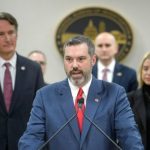Trump Pushes $100,000 Annual Fee on H-1B Visas, Shaking Up U.S. Immigration Policy
President Donald Trump has inked a proclamation that slaps a$ 100,000 periodic figure on H-1B visas, a move set to shake up the U.S. immigration system.
Coming into effect on September 21, 2025, the change will hit foreign professionals hard, particularly Indian professionals, who make up the bulk of the programme’s recipients.
The administration says the hike is designed to ensure that only top-tier talent enters the U.S. under the H-1B scheme. Commerce Secretary Howard Lutnick explained,
“We need workers. We need great workers, and this pretty much ensures that that’s what’s going to happen.”
Officials argue that the programme has been misused to replace American workers with cheaper foreign labour.
The proclamation notes that the number of foreign STEM workers in the U.S. more than doubled from 1.2 million in 2000 to nearly 2.5 million in 2019, while overall STEM jobs only grew by 44.5 per cent over the same period.
Tsunami before the weekend.
H1B visa fees 100000 USD per year
Rule signed by Trump. pic.twitter.com/5idbRYl8M1
— Dr Ambarish Toshniwal (@Eye_Fin_surgeon) September 20, 2025
Indian citizens entered 72 of the roughly 400,000 H-1B visas issued between October 2022 and September 2023. Major IT companies, including Infosys, TCS, HCL, and Wipro, received around 20,000 of these visas.
The new fee could force companies to rethink their workforce strategy. Those already in the U.S. may face job uncertainty if firms refuse to pay the $100,000 renewal cost, leaving many caught in limbo.
Tech firms have voiced alarm over the steep fees. Microsoft, JPMorgan, and others have prompted H-1B visa holders to act quickly to avoid complications before the September 21 deadline.
Lower startups and mid-sized tech companies that rely on foreign gifts may feel the pinch hardest, potentially decelerating hiring and growth.
The move raises eyebrows among legal experts, who suggest the figure could face court challenges. Critics argue that it bypasses Congress and may be seen as an overreach of presidential power.
Numerous experts advise that the policy could hurt invention and profitable growth by shrinking the pool of prospective workers. Some suggest that the top gift may simply look to other countries if the U.S. becomes too expensive or restrictive.
Alongside the fee hike, the Trump administration has launched the “Gold Card” programme.
Wealthy applicants can pay $1 million to the U.S. Treasury, or $2 million if a corporation sponsors them, for a fast-tracked path to a Green Card.
While designed to attract investment, critics say it favours money over merit and could worsen inequalities within the immigration system.
The$ 100,000 periodic figure is a seismic shift for the H-1B visa programme.
Sympathisers claim it protects American jobs and ensures only the stylish gift enters the U.S., but detractors worry it may decelerate invention and shoot professed workers overseas.
As the policy rolls out, all eyes will be on how companies acclimate and whether courts will step in to challenge the figure.






